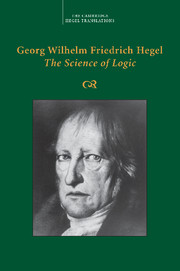Chapter 1 - The Concept
Published online by Cambridge University Press: 30 September 2021
Summary
The faculty of concepts is normally associated with the understanding, and the latter is accordingly distinguished from the faculty of judgment and from the faculty of syllogistic inferences which is formal reason. But it is particularly with reason that the understanding is contrasted, and it signifies then, not the faculty of concepts in general, but the faculty of determinate concepts, as if, as the prevailing opinion has it, the concept were only a determinate. When distinguished in this meaning from the formal faculty of judgment and from formal reason, the understanding is accordingly to be taken as the faculty of the single determinate concept. For the judgment and the syllogism or reason, as formal, are themselves only a thing of the understanding, since they are subsumed under the form of the abstract determinateness of the concept.Here, however, we are definitely not taking the concept as just abstractly determined; the understanding is therefore to be distinguished from reason only in that it is the faculty of the concept as such.
This universal concept that we now have to consider contains the three moments of universality, particularity, and singularity. The difference and the determinations which the concept gives itself in its process of distinguishing constitute the sides formerly called positedness. Since this positedness is in the concept identical with being-in-and-for-itself, each of the moments is just as much the whole concept as it is determinate concept and a determination of the concept.
It is at first pure concept, or the determination of universality. But the pure or universal concept is also only a determinate or particular concept that takes its place alongside the other concepts. Because the concept is a totality, and therefore in its universality or pure identical self-reference is essentially a determining and a distinguishing, it possesses in itself the norm by which this form of its self-identity, in pervading all the moments and comprehending them within, equally determines itself immediately as being only the universal as against the distinctness of the moments.
Second, the concept is thereby posited as this particular or determinate concept, distinct from others.
- Type
- Chapter
- Information
- Georg Wilhelm Friedrich Hegel: The Science of Logic , pp. 529 - 549Publisher: Cambridge University PressPrint publication year: 2010

